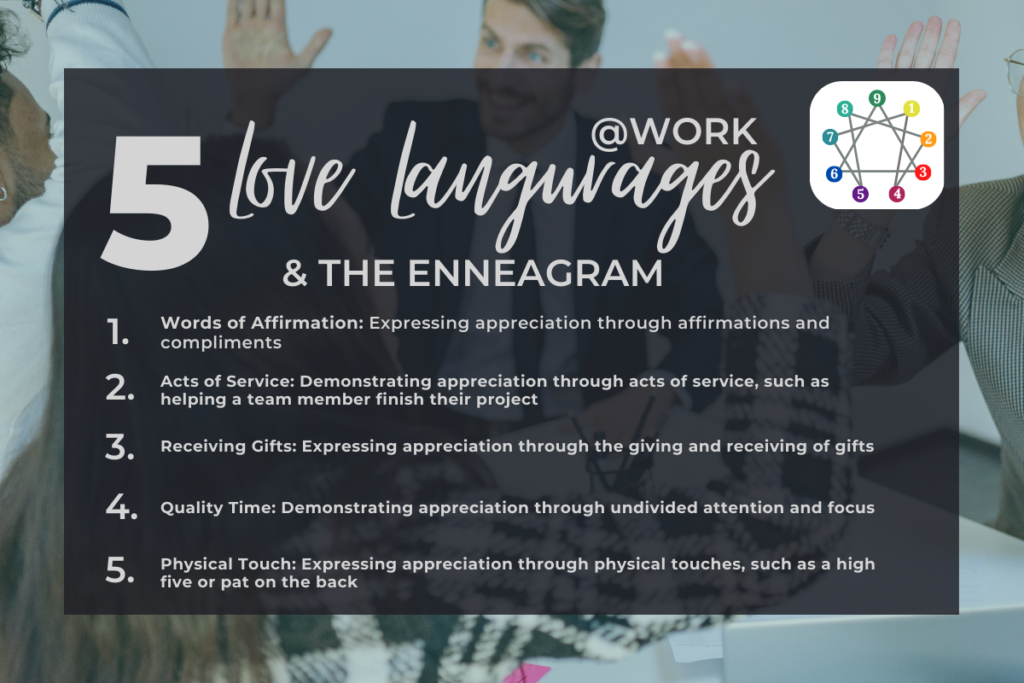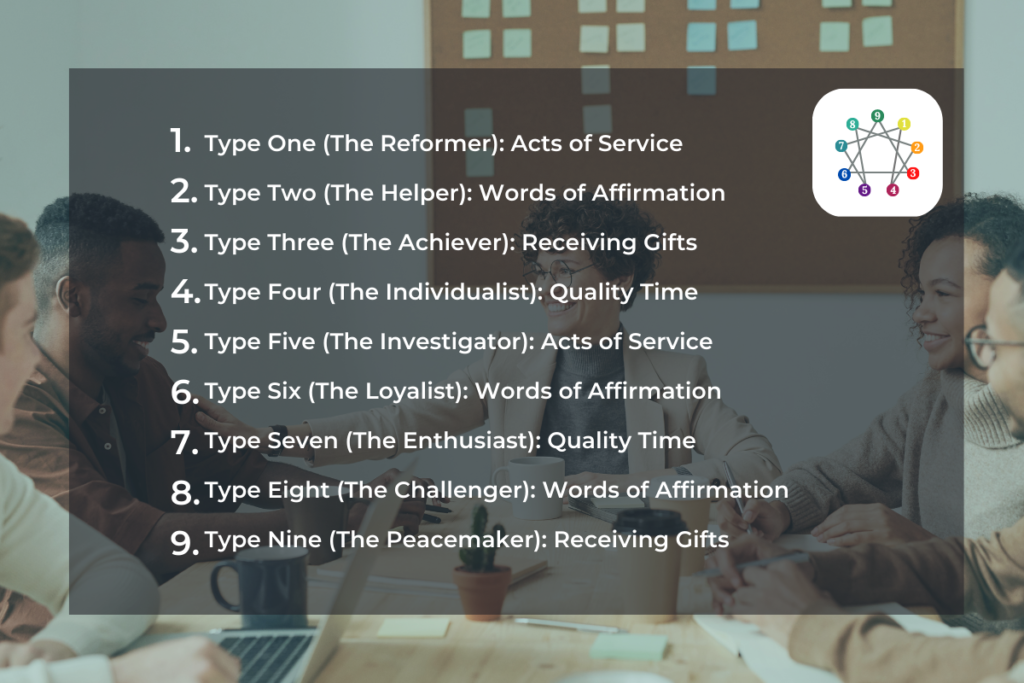What are the 5 love languages?
According to Gary Chapman, people have a primary love language, which is how they most effectively feel loved and appreciated. Understanding and speaking each other's love language can help improve communication and strengthen relationships. While the concept was originally developed for understanding romantic relationships, the five love languages can be useful in any relationship, including professional ones. Here is an overview of the 5 love languages and a few ways the love languages can apply in a work setting:

- Words of Affirmation: In the workplace, words of affirmation can take the form of positive feedback, encouragement, and recognition for a job well done. Managers can provide praise and recognition to their employees, while employees can also offer encouragement to their colleagues to boost morale and motivation.
- Quality Time: In a work setting, quality time can refer to the time spent collaborating with colleagues, engaging in team-building activities, or simply taking a break to build relationships and foster a sense of community.
- Acts of Service: Acts of service in the workplace can include taking on extra work to help a colleague, providing support during a busy period, or assisting with a project that is not necessarily part of your job description. Acts of service can show that you are invested in the team's success and can help build strong relationships with colleagues.
- Receiving Gifts: In a work setting, gifts can take the form of tokens of appreciation, such as gift cards, thank-you notes, or small tokens of appreciation for a job well done. These gifts can demonstrate that you value your colleagues and appreciate their contributions to the team.
- Physical Touch: While physical touch is not typically appropriate in a professional setting, it can be replaced with other forms of non-verbal communication, such as a handshake, high-five, or a pat on the back to show support and encouragement.
How would I find out what my love language is?
There are several ways to discover your love language, but here are some steps you can take to get started:
- Reflect on how you typically show appreciation to others. Think about the ways you naturally demonstrate that you care to those you work with. Do you express your love through a pat on the back, listening intently, writing a thank-you note, jumping in on a project, or using words to affirm and encourage them? This can give you an idea of how you tend to show love and appreciation.
- Consider what you most appreciate when others show you love. Think about the times you have felt most loved and appreciated at work. Was it through recognition, collaboration, receiving support when you were overwhelmed, or getting a hive-five for a job well done? This can help you identify how you most enjoy receiving appreciation.
- Take an online quiz. You can purchase a professional quiz, or you can find free online quizzes that can help you identify your love language. These quizzes typically ask questions about your preferences and behaviors, then provide you with an analysis of your primary love language.
- Read about the different love languages. You can read about the different love languages, including the descriptions and examples of each, to gain a better understanding of what each one means and which one resonates with you the most.
Remember that discovering your love language is an ongoing process, and it may change over time depending on your experiences and relationships. The most important thing is to communicate your love language to your team, so they can understand how to show you appreciation in a way that is meaningful to you.
How do I find out the love language of others?
Here are a few ways to determine the love language of others:
- Ask them directly: The most direct way to determine someone's love language is to ask them. You can explain that you are trying to understand how to appreciate them and ask which love language resonates with them the most.
- Learn how they express love: Take note of how the person typically shows appreciation to others. Do they frequently give gifts, offer to help with tasks, give compliments, or enjoy spending quality time with others? This can give you an indication of what their love language might be.
- Listen to how they express love: Pay attention to the words the person uses when expressing love to others. Do they often say things like "I appreciate you" or "I enjoy spending time with you"? This can help you determine whether their love language is Words of Affirmation or Quality Time.
- Consider their behavior: If you're still unsure of someone's love language, you can consider how they respond to different expressions of love. For example, if you give someone a gift and they seem more appreciative than when you spend quality time with them, it could indicate that their love language is Receiving Gifts.
Everyone is unique and may have multiple love languages, so it's essential to approach the topic with an open mind and a willingness to learn. Once you have a better understanding of the other person's love language, you can use this information to appreciate them in a way that is meaningful to them.
What happens if I don't learn my team's love language?
If you don't learn your team's love language, you may find it more challenging to communicate effectively with them and build positive relationships. Without an understanding of how team members express and receive love, you may inadvertently communicate in a way that is ineffective or even offensive to them.
For example, if you are a manager who primarily shows appreciation through words of affirmation, but your team members prefer acts of service, they may not feel valued or appreciated by your words alone. This can lead to feelings of frustration, disengagement, and even resentment.
On the other hand, by taking the time to understand your team's love language, you can tailor your communication and appreciation to meet their needs in a way that is meaningful to them. This can help build trust, improve motivation, and create a more positive work environment.
By learning your team's love language, you can also create a more cohesive and collaborative team. When team members feel understood and appreciated, they are more likely to work well together, communicate effectively, and support one another. This can lead to better teamwork, higher productivity, and greater job satisfaction.
In short, learning your team's love language is an essential step in building strong, healthy relationships in the workplace. It can help you communicate more effectively, build trust, and create a more positive and productive work environment for everyone involved.
Is there any crossover between the five love languages and the Enneagram?
The Enneagram is a personality typing system that categorizes individuals into nine distinct types based on their core motivations and fears. The five love languages and the Enneagram are often used to gain a deeper understanding of an individual's emotional needs and communication style in a relationship.
Since each Enneagram type has unique tendencies and behaviors, it can help to understand an individual's love language based on their type.
While the Enneagram can help identify an individual's tendencies and motivations, the five love languages can help partners understand how to communicate love effectively to each other. Understanding each other's love language can help to foster intimacy, trust, and mutual appreciation in a relationship.
However, it's important to note that individuals are complex and multifaceted, and the Enneagram and the five love languages are just two tools among many that can help people better understand themselves and their relationships.
What is each Enneagram's love language?
While there is no one-size-fits-all answer to this question since individuals can have their own unique preferences for how they receive love, some general patterns are often observed regarding the Enneagram types and their love languages in a work setting. Here are some possibilities for each type:

Type One (The Reformer): Acts of Service - Ones appreciate when their team takes initiative to help them with tasks or responsibilities, making their lives easier and more efficient.
Type Two (The Helper): Words of Affirmation - Twos appreciate verbal expressions of appreciation, feeling valued for who they are and what they bring to the working relationship.
Type Three (The Achiever): Receiving Gifts - Threes appreciate tangible expressions of appreciation. Awards and incentives go a long way!
Type Four (The Individualist): Quality Time - Fours appreciate spending one-on-one time with their team and creating meaningful memories together.
Type Five (The Investigator): Acts of Service - Fives appreciate when their colleagues help them with tasks, allowing them to conserve their mental and emotional energy.
Type Six (The Loyalist): Words of Affirmation - Sixes appreciate the reassurance and support from their colleagues and especially their direct reports.
Type Seven (The Enthusiast): Quality Time - Sevens appreciate when their teammates jump into adventurous activities with them, allowing them to experience new things and make exciting memories together.
Type Eight (The Challenger): Words of Affirmation - Eights appreciate when they are recognized for their strength and ability to get things done.
Type Nine (The Peacemaker): Receiving Gifts - Nines appreciate when their teammates take the time to give them thoughtful gifts, seeing it as a way to show they are essential and valued.
The benefits of knowing your team's Love Language and Enneagram Type
Knowing other people's personality types can be helpful in various contexts, including personal and professional relationships, team dynamics, and communication. Here are a few reasons why knowing other people's personality types can be useful:
Improved communication: Knowing someone's personality type can help you tailor your communication style to better fit their preferences. For example, if someone is introverted, they may prefer to communicate through email rather than face-to-face meetings.
Better teamwork: Understanding the personality types of your team members can help you work more effectively together. For instance, if you know that someone on your team is very detail-oriented, you might assign them tasks that require a lot of attention to detail.
Conflict resolution: Knowing someone's personality type can help you understand where they're coming from in a conflict. For example, if someone is a "big picture" thinker, they might not understand the importance of small details that are important to you. Understanding this difference in perspective can help you resolve conflicts more effectively.
Personal growth: Knowing other people's personality types can also help you grow as a person. For instance, if you're an extroverted person who tends to jump into social situations, you might learn from an introverted friend who takes more time to reflect before acting.
Overall, knowing other people's personality types can help you build stronger, more effective relationships, both personally and professionally. Consider signing up for an Enneagram Team Training to learn your team’s personality type and start growing your professional relationships.


